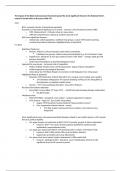The impact of the Black Consciousness Movement posed the most significant threat to the National Party’s
control in South Africa in the years 1968–78.’
Intro:
- BCM, economic threats, international opposition
- Economic & international significant to an extent – however, only threatened control 1980s
o 1985 ‘disinvestment’, US banks refuse to renew loans
o 1980 UN comprehensive cultural & academic boycott of SA
- BCM most significant because:
o widespread, united opposition, mobilised new groups, caused 1976 Soweto Uprising,
received international attention, highlighted flaws of apartheid
P1: BCM
- Redefined ‘blackness’
o Africans, Indians & Coloured people could relate & participate
Mobilized new groups, Indians/coloured participated (e.g. Uni of Western Cape)
o English press, Afrikaners & even gov replaced ‘bantu’ with ‘black’ – changes imply gov felt
pressure from BCM
o Undermined foundations of apartheid (displayed unity)
- Appealed to new groups – increased scale of opposition
o Media, SA Black Theatre Union (1972), black poets, slogans (‘black is beautiful’)
o Unified oppressed, psychological liberation
o Unity shown by 1972 Black People’s Convention (1,400 delegates from 145 groups)
- Highlighted flaws of apartheid
o Education (1959 Extension of Bantu Education Act, unequal, overcrowded, poor quality)
1972 Abraham Onkgopotse Tiro speech attacking Turfloop uni for inequalities &
discrimination expelled, implies threat
o Soweto – 1974 Transvaal Bantu Education, Treurnicht, Afrikaans
- Received international attention
o Steve Biko’s funeral (died 12th Sept 1977) – >10,000 attended including foreign ambassadors
Key BCM leader
- Mobilised youth
o SASO 1969 (Biko = president), more radical – uniquely appealed to students
o 1976 Soweto – large (16th June 2,000), long-lasting
August 1976 Mashinini, Soweto Students’ Representative Council
Gov. suppression indicates threat = severe
575 died, leaders imprisoned (Terror Lekota), most violence since
Sharpeville
- Most significant because: threatened apartheid ideology, helped to turn public opinion vs NP, Soweto
threat to political stability
o Can argue Soweto not solely due to BCM (1974 Treurnicht, growth of African education)
however, BCM = key cause, directly opposed apartheid & sparked youth
mobilisation (unprecedented scale)
o Can argue gov suppressed (March 1973 banning orders vs SASO, 1975 SASO-9 trial)
However, didn’t stifle activity (this occurred before Soweto)
Suppression provoked outcry (e.g. Biko death)
o Can argue short-term impact (Leaders imprisoned, 4,000 youths fled)
However, ideological shift = long-term, even if mobilization short-term still
significant threat to NP control in period




